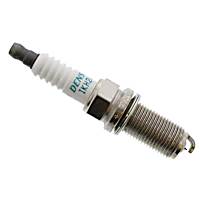All cars have an ignition system with one or more ignition coils. Ignition coils are designed to convert the low-voltage from the battery into the high-voltage needed to fire the spark plugs.
Because ignition coils are such an integral part of the ignition system, they almost always cause noticeable symptoms when they fail.

Signs of a Bad Ignition Coil
Do you think your car might have a bad ignition coil? If you’re experiencing one or more of the following symptoms, you may be right.
Engine Misfire
Since ignition coils play a role in igniting the engine’s air-fuel mixture, a faulty coil can easily cause a misfire. A misfire happens when there’s incomplete combustion (or zero combustion) inside one or more of the engine’s cylinders.
The phenomenon will feel like a hesitation or shaking when the car is running. You may notice the problem intensifies when the engine is under a heavy load (e.g., accelerating).

Illuminated Check Engine Light
On modern cars, a computer (often referred to as the powertrain control module), looks for problems that could potentially lead to an increase in vehicle emissions. One such problem is an engine misfire caused by a faulty coil. The PCM will usually detect the misfire—and possibly an issue with the coil’s electrical circuit—and turn on the check engine light.
Car Won’t Start
While most modern engines have one ignition coil per cylinder, older vehicles use a single coil to supply voltage to all of the spark plugs. If that lone coil fails, none of the cylinders will receive spark, resulting in a car that cranks but doesn’t start.

The Engine Stalls
Like most electrical devices, ignition coils can experience intermittent problems. When this happens, the engine may stall unexpectedly. Stalling mostly happens to engines with just one ignition coil.
Reduced Fuel Economy
A faulty ignition coil usually results in an engine that misfires and runs poorly, leading to a reduction in fuel economy.
What Does an Ignition Coil Do?
An ignition coil is a transformer that converts battery voltage into the tens of thousands of volts needed to fire the spark plugs. Ignition coil operation is based on a phenomenon called electromagnetic induction—a process that uses a magnetic field to generate electrical current.
Inside the coil, there are two sets of windings. The so-called primary windings contain a hundred or so coils of wire, whereas the secondary windings have thousands of coils of wire.

When the ignition coil is energized, battery voltage flows through the primary windings, creating a magnetic field. Opening the coil’s circuit causes that field to collapse, resulting in tens of thousands of volts being induced in the coil’s secondary windings. The high voltage from the secondary windings then travels from the coil to the rest of the ignition system.
It’s important to note that there are different types of ignition coils. Older vehicles have a single ignition coil that’s connected to a distributor via an ignition wire. High-voltage travels from the coil to the distributor, which, in turn, distributes that voltage to the individual spark plugs and wires.
Newer vehicles use either coil-on-plug (COP) ignition coils or coil packs. Engines with a COP ignition system have one ignition coil per cylinder. Each coil sits directly on top of a spark plug.
Meanwhile, a coil pack is a group of ignition coils combined together in a single molded block. With this design, each cylinder gets its own ignition tower but shares its coil with a companion cylinder.

Here’s a video about how ignition coil works:
How to Tell If an Ignition Coil is Bad
You must test an ignition coil to determine whether it’s bad. As we discuss in our article on how to test a coil pack or ignition coil, several test methods are available,
Check out these tutorial videos in case you need to replace your ignition coil:
Is It Ok to Drive With a Bad Ignition Coil?
A faulty ignition coil can damage other parts of the vehicle, such as the catalytic converter, the powertrain control module—even the engine. A faulty coil should be replaced right away to avoid bigger problems down the road.
Where to Get a Dependable Ignition Coil for Your Vehicle
A bad ignition coil will cause serious problems for your engine, such as misfires and stalling. If left unattended, the malfunctioning part can also affect other engine parts that cost more to repair or replace. Fortunately, we make it easy to get a replacement ignition coil from CarParts.com.
Here at CarParts.com, it’s our mission to help you quickly get your vehicle back on the road where it belongs. Order now and get your new ignition coil in as fast as two business days. We provide accurate and detailed information on a part’s fitment to guarantee it will fit your vehicle perfectly. And if for some reason you aren’t fully satisfied with your order, we accept returns within 60 days of purchase with money-back guarantee.
Don’t wait for an old or damaged ignition coil to give up the ghost. Check out our extensive selection of dependable ignition coils and shop now at CarParts.com.
Products Mentioned in this Guide
Any information provided on this Website is for informational purposes only and is not intended to replace consultation with a professional mechanic. The accuracy and timeliness of the information may change from the time of publication.

 Ignition Coil
Ignition Coil
 Spark Plug
Spark Plug

























